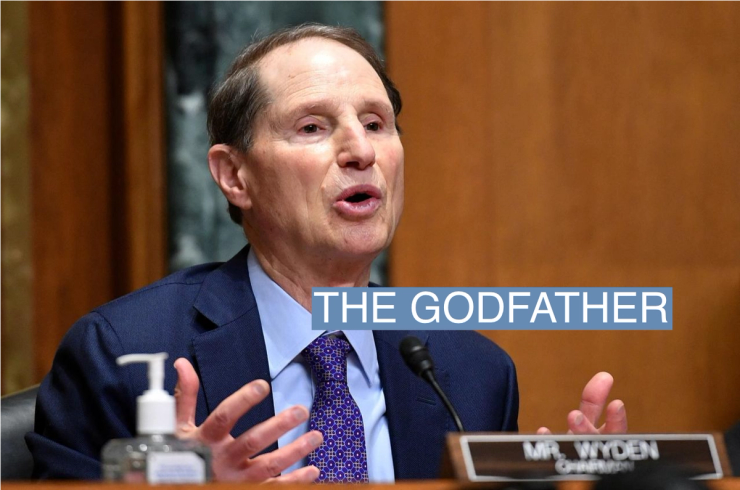The News
Oregon Sen. Ron Wyden is in many ways the godfather of the Inflation Reduction Act. While the Senate Finance Committee chairman’s role in crafting the law was often overshadowed by a certain colleague from West Virginia, his Clean Energy For America Act formed the core of the bill’s climate section, which rewrote the tax code to provide hundreds of billions of dollars in subsidies for the development of carbon free electricity and technologies.
With the IRA’s first anniversary this week, I called up Wyden to discuss the climate law’s past and future. We talked about what it would take to make the law succeed, but also its underappreciated history — particularly how he began laying the foundation for it in a meeting with Sens. Joe Manchin and Lisa Murkowski way back in 2012.
The conversation has been edited for length and clarity.
The Interview
Jordan Weissmann: How are you feeling about the IRA’s results so far?
Senator Ron Wyden: I think, by any objective measure, the Clean Energy for America Act — which is essentially what was adopted, which passed the Finance Committee and I worked on for many years — is beating expectations. We looked at, in the early summer of 2021, when we passed it out of committee, probably $370 billion worth of private sector investments. And today, hardly a week goes by without people in the private sector, who aren’t political, saying that we’re going to surpass it.
And if you look at what we set out to do, which was to break decades of gridlock, where people had tried regulatory approaches, they had tried cap and trade, and they tried carbon taxes — we’ve exceeded expectations.
Jordan Weissmann: A lot of climate activists were unhappy with the bill when it was first passed because it didn’t do enough to directly limit carbon emissions in their view and included concessions for fossil fuels. What do you tell those critics today?
Senator Ron Wyden: First of all, I’m not sure who the critics are, because I’ve got environmental groups, having some kind of ceremony or meeting with me to congratulate me for all that we’ve done. So look, there’s a tremendous amount still to do. Nobody is possibly going to say that this is it. I said, look, using a private sector, market-oriented, no-mandate approach is, I think, going to achieve very substantial results. But nobody ever said that this was it. And we have enormous challenges in terms of transmission capability I believe we can address permanently in a way that speeds up renewable solar, wind, geothermal, and hydro without breaking the environmental law. I think we’re off to a very strong start.
Jordan Weissmann: You brought up permitting reform. A lot of people have worried that if Congress can’t pass something on that issue, especially around transmission, that the IRA is in some sense going to go to waste. Do you think that’s true?
Senator Ron Wyden: Well certainly, I want to see these issues addressed to tap the full potential, but I just came from a very significant and growing employer in Clackamas County outside Portland, a battery company, that walked me through an enormous building and said ‘you come back soon, because we’re gonna have another built.’
So there’s no question, Jordan, that there’s a lot more to do. And that transmission and permitting are really at the heart of it. But look at what the markets are saying now about private sector investment, I mean private sector investment in renewables is, by a number of these projections, really on the ascent.
Jordan Weissmann: You like getting into the weeds a bit about issues. I want to ask you a slightly weedsy question about permitting reform.
Senator Ron Wyden: We do weeds all the time.
Jordan Weissmann: So Chuck Schumer recently sent a letter to FERC urging them to move aggressively on transmission. And it seemed he was sort of implying that regulators might have the power to make the reforms that Democrats want in any permitting deal, that you could do it by executive authority. Do you think that’s the case? Do you think regulators can kind of take care of the Democratic to-do list here or is that not really a viable substitute for a deal in Congress?
Senator Ron Wyden: I think there is a role for the executive branch. I talk to John Podesta all the time, and they’re working on very important issues that I felt very strongly about. Tom Carper and I led the effort for direct pay. There are important roles for the agencies, they’re called the expert agencies for a reason. They have technical capabilities that you kind of lay out the framework in a bill and then they go from there, and I think there’s a role for Congress, and I’m not going to say that you can get this done without looking to all three areas as you go ahead.
Jordan Weissmann: What parts of the implementation of this bill are you most worried about these days?
Senator Ron Wyden: Obviously, there are lots of questions about the transportation sector. I’m still baffled by some of what you see from overseas when people come in and say, “Oh, my goodness, Clean Energy for America Act is going to hamper us,” I always tell them, “why don’t you guys go do your own?” We came up with some ideas that we thought were really breakthrough.
Can I just, I want to weed out. Can I weed out a little bit on the technology neutrality issue?
Jordan Weissmann: Yeah, please do. [Editor’s note: Technology neutrality is the principle underpinning the IRA that the government will subsidize all sources of emissions-free electricity, whether or not it comes from renewables like solar or wind. It was one of Manchin’s key demands in the bill.]
Senator Ron Wyden: This was key to getting this bill passed. And I recognize that there were some on the right, there were some on the left, who didn’t like that, because they didn’t get everything they wanted. And I said to environmental folks what we do with technological neutrality is, first and foremost, encourage good science. Because, Jordan, nobody really knows what the big carbon reducers are going to be 20 years from now.
I set out to do this after the collapse of cap and trade — and you probably know that Joe Manchin invited Senator Murkowski and I to come and meet with his constituents shortly afterwards in West Virginia when we started fleshing this out. And I said, look, I know that the refrain, particularly from conservatives, is “all of the above.” Well, there’s a better way to do this that’s more science-oriented, which is technological neutrality, and to encourage everybody to try to look to the future science and say, the more you reduce carbon, the bigger your tax saving opportunities. I remember those conversations like they were yesterday with a number of my colleagues who had been opposed to bills in the past. And they said, I can support that.
Jordan Weissmann: What do you make of Manchin’s complaints about the bill now? I mean, he’s been in this sort of duel with the White House for months and months and months. Do you think he’s sincere?
Senator Ron Wyden: I’m not gonna question his motives, or things of that nature. What I will tell you is he invited me out after the collapse of cap and trade. I spent an enormous amount of time studying for that visit. My wife just said “What are you doing?” I was a whirling dervish, with all these papers and reports. And I said, “I’m trying to break 40 years’ worth of gridlock.” Everything had gone by the boards. Cap and trade had gone by the boards, regulatory approaches had gone by the boards, carbon taxes had gone by the boards. I’m a junior member of the Finance Committee. And I said to myself, I think I’m sitting on the motherload. Billions of dollars in these tax credits, which had been in this bizarre kind of tax extension absurdity. Some of these things had a tax life a little bit longer than a carton of eggs. And so there’s no predictability and there was no certainty. And when I went to see Senator Manchin with Senator Murkowski, I worked really hard in trying to lay out the foundation. And that foundation became law.
Jordan Weissmann: So the origins of this compromise, of what became the IRA, really date back all the way to the immediate aftermath of when cap and trade failed. You were negotiating this with Joe Manchin back not long after he had just shot that climate bill [in an ad].
Senator Ron Wyden: Let me give a little bit more history. After cap and trade went down, I also told Majority Leader Reid and Senator Schumer, both of whom were very interested in it, because we all knew each other a long time. And they all said this is kind of Ron’s thing. He’s a policy guy, he’s that he’s in the weeds, and all that. And I’ve always said I’m gonna bring you these ideas, you’re not gonna read about them in the newspaper first. And so by the time I went to West Virginia for the visit at Senator Manchin’s request, we had already had drafts and a fair number of senators signing on as co-sponsors, and there was a lot of interest. Senator Cantwell, Leader Reid, Senator Schumer who was then not the leader, all three were very supportive of what I was trying to do from the get-go.
Jordan Weissmann: And then this evolved over the course of eight more years, essentially into the bill that became the core of the IRA.
Senator Ron Wyden: What we kept doing is in each Congress, we kept refining it. And I think our last number of sponsors was about 35, or pretty close.
Jordan Weissmann: Does it worry you that most Americans don’t seem to know what the IRA did? Or possibly haven’t even heard about the bill?
Senator Ron Wyden: Yeah, I mean, look — you guys know that I do a lot of technology work. There is so much information out there today, such an abundance of content, it just takes a while to make sure that information really actually sinks in. I often say today, if you came up with some magical, incredible medical miracle, it still would take time to kind of lay out what it means for people. I’ve had 1,061 open town hall meetings. And often I get asked about this, where people are like I heard something about it and what does it do?
Jordan Weissmann: Do you think Democrats have fallen down on messaging at all with the bill?
Senator Ron Wyden: There’s more to do. Again, you can say should this group have done that. This group has done that. There’s a lot more to do. The way information is disseminated and absorbed today is — I mean, it’s so different. It’s just very, very different and much more challenging.
Jordan Weissmann: Republicans are already talking about repealing the bill in order to fund their own tax plans. Sort of reminds me of the way Democrats promised to repeal the Trump tax cuts. Do you think it’s a real danger that might happen? Or are these tax credits basically unkillable at this point, because of the way industry has embraced them?
Senator Ron Wyden: Yeah, I’ll be curious what Republican members come back in the fall saying with respect to these tax credits, that their big employers are using to provide high-skill, high-price jobs in their district. I think they’re going to continue to head home for visits in the district. And they’re gonna see more and more of their employers saying this is where we want to go for the future.


